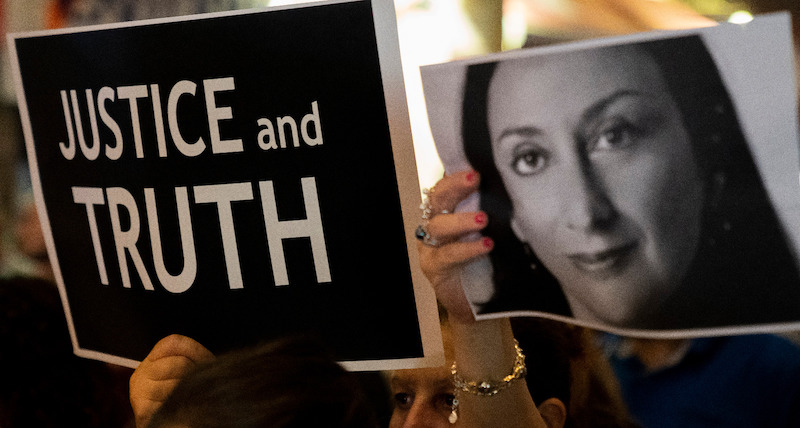In Malta, where everything is upside down and topsy-turvy, this guide is designed as a brief induction into the operational methods of the smallest State in the EU. The ideal dummy is visualised as a foreigner, an outsider, a barrani, a person of European origin who’s been instilled with European values since birth. Our weekly articles are aimed at helping you to (somehow) get ‘Malta’.
This week marks one year since the brutal assassination of Daphne Caruana Galizia who rigorously exposed the extreme levels of corruption in Malta.
To say there was a full-scale demonisation campaign mounted against her is no exaggeration. She was consistently attacked, vilified, and dehumanised so that by the time of her assassination, this process was complete.
As a result, in public, and in an apparently ‘normal’ way, people felt free to say ‘She was a hate blogger’; ‘She said cruel things about people’; ‘She deserved it.’
Such sentiments were epitomised by a Facebook post made by a police sergeant on the day of her murder. Ramon Mifsud, exposed on Running Commentary for his appalling behaviour in a Paceville bar, ‘celebrated’ her death with the words, “Everybody gets what they deserve, cow dung”. The police inquiry into his gross misconduct is still pending and Mifsud remains suspended on half pay.
The primal nature of Mifsud’s abuse finds its medieval counterpart in the frequent reference to Caruana Galizia as “the witch of Bidnija” and she was burned to death, and her death was celebrated in Labour’s online hate groups.
Incorporating fascist ideology, she was referred to as a “cockroach” and someone deposited cockroaches at the site of her grave.
Towards the end of her life, the Opposition Leader derided her through his infamous phrase “bicca blogger”. The pejorative and dehumanising labelling process couldn’t have been more specific in its calculated aim and its chilling effect.
This is how demonisation works: you ostracise an individual; you isolate them verbally, physically and psychologically; you depict them as vermin and, as with any ‘infestation’, you then, and ‘justifiably’, get rid of them.
The normal human response of shock and horror is no doubt being experienced as we speak, and this position is self-evident in the reaction of Simon Reeve in his BBC travelogue. Speaking to the journalist Manuel Delia at the site of Caruana Galizia’s death, he recoils, saying, “It’s the 21st century and on this spot, down that road, a journalist was killed with a car bomb and died in this field. It is an absolutely incredible event. It should shake the absolute pillars of society here”.
In this smallest EU state, the absolute pillars of society have been shaking with rage since the journalist’s murder, intent on crucifying any critical voices in the most literal of ways.
Utilising a considerable array of crude but effective propaganda tools (including government controlled newspapers, TV and radio stations as well as secret online Facebook groups counting many PEPs as members), the government has launched a full-scale attack on “traitors” who ‘spread devious conspiracy theories abroad’ and even influence innocuous taxi drivers as far away as South America.
Any European could now be wondering if Malta lives in a parallel universe, which is exactly how Prime Minister Joseph Muscat described Opposition MP Simon Busuttil when, in a parliamentary debate more akin to a brawl, Busuttil asserted that he still believes that Muscat or his wife owns Panama company Egrant.
The magisterial inquiry was by a report filed by the Prime Minister’s lawyers, which ensured that no evidence could be found to link him or his wife to Egrant, the removal of evidence being something for which the now defunct Mossack Fonseca are renowned and a staple ingredient of money laundering.
The numerous and transparent flaws in using the Egrant report to absolve the government – bearing in mind the government is using its own inquiry for its own absolution – become more ludicrous given that the Justice Minister said he was acting as the Prime Minister’s “legal counsel”.
This same Justice Minister, spokesperson for a government resisting a public inquiry into Caruana Galizia’s assassination, has no qualms in saying that “we did everything we could to solve the murder.”
He said this two days after La Repubblica revealed further links between the Economy Minister and those accused of the assassination. Chris Cardona dismissed these links as “smears” and a counter campaign was set in motion.
In a parallel universe replete with hubris, cynicism and gaping irony, Muscat delivered an attack on Busuttil exemplary of Orwellian doublethink: “Someone who believed a lie was a liar, and someone who backed a fraud was a fraudster”.
Whatever ‘flat earth’ theory the Labour Party espouses, there remains one stark, awful and indisputable fact which, only within the logic of a medieval witch trial, brands us heretics and traitors if we refuse to forget: “A year ago, we lived in a country where a journalist was unbearably harassed. Now we live in a country where a journalist has been killed.”
This week in this country, press freedom organisations have been out in force in the shape of Reporters Without Borders, PEN International, the European Federation of Journalists, Committee to Protect Journalists, European Centre for Press and Media Freedom and the International Press Institute. The parallel universe of ‘serenity’ concocted by Muscat’s government acquires a very different hue in the light of their damning report.












